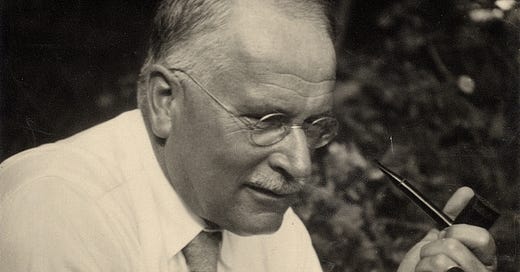The Modern Soul in the Wake of Carl Jung
Jung had a lot of insights and a dubious set of answers. What are we to do with his work?
*
“Jordan Peterson is Carl Jung for people who don’t want to read Carl Jung.” So goes the cliche in criticisms of Jordan Peterson, and while it may be true, it’s also true that Peterson introduced a generation to the largely academically sidelined work of Carl Jung. Clearly, plenty of those who followed Peterson in his early success did want to read Jung. If you looked in 2017–19 at Peterson’s books on Amazon and scrolled down to “customers also bought” you found people like Jung, Mircea Eliade and Erich Neumann, dormant beasts of thought that Jordan Peterson awoke from their slumber to be read again by a new generation.
How far many actually got into reading Jung is another question. Jung is far more quotable than he is readable, and his work is complex and to say the least, difficult. You are presented with the kind of writing where one sentence will cause you to consider him a visionary genius, another a superstitious crackpot.
Then there is his legacy. Jung has not just been academically sidelined, but much psychology today that calls itself “Jungian” is a minefield of woo and bears a mixed resemblance to anything Jung wrote. If you were to read only the work of someone such as Robert L. Moore, a Professor of Psychoanalysis who studied under Mircea Eliade and considered himself “Jungian,” you might be content to consider Jung’s work nonsense. Moore’s book King, Warrior, Magician, Lover: Rediscovering the Archetypes of the Mature Masculine, simply assumes the archetypes to be nothing more than a set of attributes that you embody based on a bunch of stuff Moore happened to think about what it might mean to be a ‘magician’ or a ‘lover.’
One of the problems with writers like Moore and others who wish to cosplay Jung’s genius is that Jung was absolutely mind-bogglingly learned. He spoke Latin, Greek, English, French, Italian, German, and read many ancient languages, he was familiar with myth, literature, philosophy and religion at a level that extended across the most obscure of traditions, and accumulated a huge amount of observations about the dreams and experiences of his patients. Today all you need to become a “Jungian analyst” is a bachelors degree and enough hours as a therapist under your belt and you can start claiming that your interpretation of dreams comes with the searing authority of Jung himself.
Yet there are many ways in which Jung was an extremely important figure, he represents the intersection of science and religion, myth and fact, the complex difficulty of connecting these things together into a scheme and so represents some of the key problems that beset the mess of the modern world, and perhaps beset more than anyone those trying to repackage religion, myth and stories for a modern audience, even if they don’t know it.
Keep reading with a 7-day free trial
Subscribe to This Isle is Full of Noises to keep reading this post and get 7 days of free access to the full post archives.




